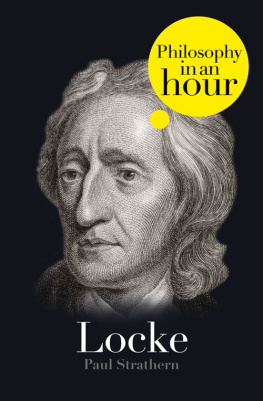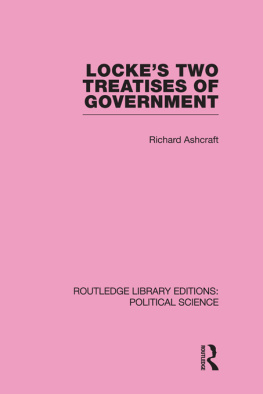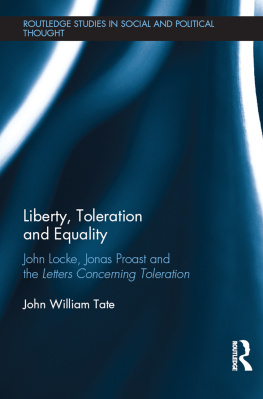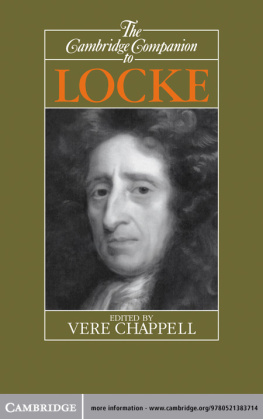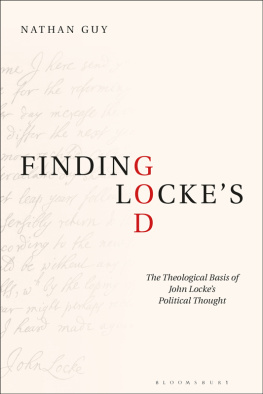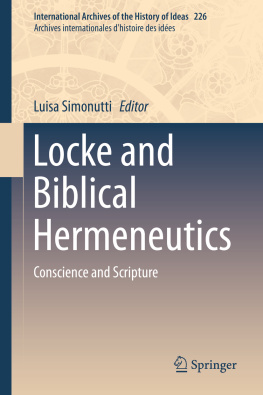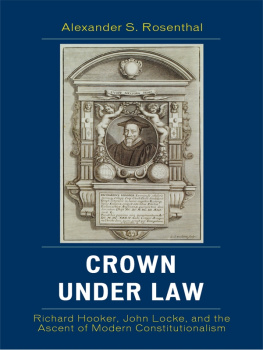LOCKE ON PERSONAL IDENTITY

PRINCETON MONOGRAPHS IN PHILOSOPHY
Harry G. Frankfurt, Editor

The Princeton Monographs in Philosophy series offers short
historical and systematic studies on a wide variety
of philosophical topics.
Justice Is Conflict by Stuart Hampshire
Liberty Worth the Name: Locke on Free Agency by Gideon Yaffe
Self-Deception Unmasked by Alfred R. Mele
Public Goods, Private Goods by Raymond Geuss
Welfare and Rational Care by Stephen Darwall
A Defense of Hume on Miracles by Robert J. Fogelin
Kierkegaards Concept of Despair by Michael Theunissen
Physicalism, or Something Near Enough by Jaegwon Kim
Philosophical Myths of the Fall by Stephen Mulhall
Fixing Frege by John P. Burgess
Kant and Skepticism by Michael N. Forster
Thinking of Others: On the Talent for Metaphor by Ted Cohen
The Apologetics of Evil: The Case of Iago by Richard Raatzsch
Social Conventions: From Language to Law by Andrei Marmor
Taking Wittgenstein at His Word: A Textual Study by Robert J. Fogelin
The Pathologies of Individual Freedom: Hegels Social Theory by Axel Honneth
Michael Oakeshotts Skepticism by Aryeh Botwinick
Hegel on Self-Consciousness: Desire and Death in
Hegels Phenomenology of Spirit by Robert B. Pippin
Locke on Personal Identity: Consciousness and Concernment
by Galen Strawson
LOCKE ON
PERSONAL IDENTITY
Consciousness and Concernment
Galen Strawson

Copyright 2011 by Princeton University Press
Published by Princeton University Press, 41 William Street,
Princeton, New Jersey 08540
In the United Kingdom: Princeton University Press, 6 Oxford
Street, Woodstock, Oxfordshire OX20 1TW
press.princeton.edu
All Rights Reserved
Strawson, Galen.
Locke on personal identity : consciousness and concernment/
Galen Strawson.
p. cm. (Princeton monographs in philosophy)
Includes bibliographical references and index.
ISBN 978-0-691-14757-4 (hardcover : alk. paper)
1. Locke, John, 1632-1704. Of identity and diversity.
2. Identity (Psychology) I. Title.
B1294.S87 2011
126.092dc22 2011003915
British Library Cataloging-in-Publication Data is available
This book has been composed in Janson
Printed on acid-free paper.
Printed in the United States of America
1 3 5 7 9 10 8 6 4 2
I DO NOT KNOW HOW WE MAY EVER KNOW, IN RETRACING THE RECORD OF THE PAST, WHERE OUR RESPONSIBILITY LIES, AND WHERE WE HAVE MERELY UNDERGONE RATHER THAN ENACTED, LIVED THROUGH RATHER THAN LIVED, AN EVENT, UNLESS BY THE SENSE WE HAVE OF ABIDING IDENTITY WITH THAT PAST SELF, OR EVENT, OR ACTION PERFORMED, FOR BETTER OR FOR WORSE. I FIND, FOR MYSELF, THAT THIS SENSE OF IDENTITY WITH PAST SELVES IS BY NO MEANS CONTINUOUS. IT IS RATHER AS IF AT TIMES I WAS PRESENT IN MY LIFE, AT OTHER TIMES ABSENT FROM IT ALTOGETHER; ESPECIALLY AFTER MY CHILDHOOD. THE MIND WHICH WANDERED AMONG THE STRUCTURES OF MOSSES AND LYCOPODIA IN THE LABORATORIES OF DOWNING STREET WAS CERTAINLY MINE; BUT NOT THE GIRTON UNDERGRADUATE WHOM MANY OF MY CONTEMPORARIES SEEM TO REMEMBER BETTER THAN I REMEMBER MYSELF; NOR THE NEUROTIC BOHEMIAN WHO SO DISHONOURABLY PROLONGED HER RESIDENCE IN CAMBRIDGE, WHICH SHE DARED NOT LEAVE BECAUSE SHE DID NOT KNOW WHERE ELSE TO GO, BY THE TRAVESTY OF A MARRIAGE.
KATHLEEN RAINE
NATTENDEZ PAS LE JUDGMENT DERNIER. IL A LIEU TOUS LES JOURS.
ALBERT CAMUS
1975: 74. Raine is referring to Downing St. in Cambridge. As far as I know, she knew nothing of Lockes views on personal identity.
1956: 111.
Contents
CHAPTER 1
Introduction
CHAPTER 2
Person
CHAPTER 3
Person... is a forensic term
CHAPTER 4
Concernment
CHAPTER 5
Consciousness
CHAPTER 6
Consciousness... is inseparable from thinking
CHAPTER 7
From the inside
CHAPTER 8
PersonLockes Definition
CHAPTER 9
Consciousness Is Not Memory
CHAPTER 10
Personal Identity
CHAPTER 11
Psychological Connectedness
CHAPTER 12
Transition (Butler Dismissed)
CHAPTER 13
But next...: Personal Identity
without Substantial Continuity
CHAPTER 14
And therefore...: [I]-transfers,
[Ag]-transfers, [P]-transfers
CHAPTER 15
A fatal error of theirs
CHAPTER 16
A Fatal Error of Lockes?
CHAPTER 17
Circularity?
CHAPTER 18
The Distinction between [P] and [S]
CHAPTER 19
Concernment and Repentance
CHAPTER 20
Conclusion
APPENDIX 1
Of Identity and Diversity by John Locke
APPENDIX 2
A Defence of Mr. Lockes Opinion Concerning
Personal Identity by Edmund Law
Preface
THIS BOOK BEGAN as a paper in the autumn of 1994, when I reread Lockes discussion of personal identity in book 2, chapter 27 (2.27) of his Essay concerning Human Understanding, three hundred years after its first publication in 1694, and realized that Id been misrepresenting him in tutorials at Oxford for fifteen years. I should have inferred this from the fact that Michael Ayerss chapter on personal identity in volume 2 of his book Locke (1991) had a year earlier seemed bizarrely peripheral to the subject I thought I knew and in any case taught. Reading Ayers is one of the things that sent me back to Lockes textfor better or for worse.
I set out to correct my errors in writing (with some enthusiasm, because I knew many held the same false views as I had), but was sidetracked early in 1995 by an invitation to give a lecture on the notion of the self in the 1996 Wolfson College lecture series From Soul to Self.An Essay in Revisionary Metaphysics. In the meantime, Marya Schechtmans important brief observations about Locke in her book The Constitution of Selves (1996: 1059) and Udo Thiels outstanding article Personal Identity (1998) were published, and I came to feel that the paper would be largely superfluous. Don Garretts paper Locke on Personal Identity, Consciousness, and Fatal Errors (2003) later took some further steps in the right direction.
Appointment to a professorship at the City University of New York Graduate Center in 2003, and the faith of those who appointed me that I was a historian of philosophy, in addition to being a philosopher of mind, together with their expectation that this would be manifested in some way in my teaching, brought me back to Lockes account of personal identity. It also prompted me to prepare a modern English version of 2.27 of the Essay for pupils on both sides of the Atlantic (see Few who read Locke today have such a background, and many are not native speakers.
The Day of Judgment plays an important part in Lockes discussion of personal identity, but those wholike myselfdont believe in God or the Day of Judgment shouldnt think that their place in Lockes theory makes it less interesting. All questions about the Day of Judgment can be converted into wholly earthly questions about ones overall moral status or being as one stands here now, firmly on the ground, with no prospect of going anywhere else. The idea of the
This book, though short, may be judged to be too long. One reason for its length is that I restate points in different ways. Some ways seem more helpful to some readers, others to others. It may not help to note that it can be said of Lockes chapter, as it can be said of many a book,
Next page

